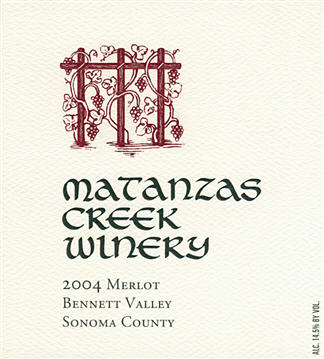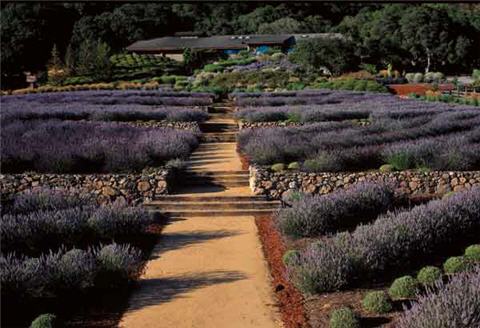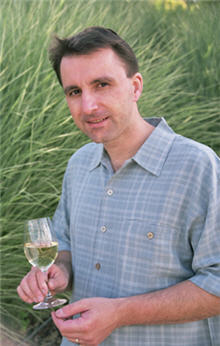

Matanzas Creek has always been known for its exceptional Merlot production.
MATANZAS CREEK
Alan Goldfarb talks with one of the original owners of Matanzas Creek Winery and with the current winemaker to get the past and current perspective of the renown Bennett Valley winery.
by
Alan Goldfarb
July 31, 2009
 atanzas Creek’s wines in 2009 are decidedly not Sandra and Bill MacIver’s wines of the 1990s. For one, the vineyard that was instrumental in putting world-class Merlot on the American map has been lost to disease. For another, the MacIvers, who seemingly fell off the face of the planet the day at the dawning of the new century when they sold their winery to Jess Jackson, have hardly taken a sniff of Matanzas Creek.
atanzas Creek’s wines in 2009 are decidedly not Sandra and Bill MacIver’s wines of the 1990s. For one, the vineyard that was instrumental in putting world-class Merlot on the American map has been lost to disease. For another, the MacIvers, who seemingly fell off the face of the planet the day at the dawning of the new century when they sold their winery to Jess Jackson, have hardly taken a sniff of Matanzas Creek.
The couple, who have been hanging around the California coast for the last nine years, took their money - $48 million to be precise – and dabbled in real estate, worked on writing books, and enjoyed being grandparents. These days, with some of the last Matanzas wines being funneled to them as per the sales terms, the MacIvers make sure to drink a glass a day, albeit mostly less expensive.
Reached in Mendocino, where they split their time between that coastal town and the San Francisco peninsula to the south, Sandra MacIver tells APPELLATION AMERICA, “… The wines are not the same profile, but they’re excellent wines. I’m not unhappy about the quality they (Jackson Family Wines) produce.” But she says the current Matanzas wines lack the consistency of the vineyards that she and her husband began to achieve in the late to early ‘90s.
“Jess (Jackson) has more in resources, more choices, more blending capabilities (than we had). We always stuck with quality and consistency. They stick with

Matanzas Creek’s gardens are redolent with the hundreds of lavender bushes set in front of the main building.
“(The wines are) consistent in quality (but) they’re (now) developing a style (and) they know where they want to go with it,” she explains. “The vineyards they’ve planted are remarkable. The quality effort that’s gone into building those varied, challenging vineyards, is the unsung story of that operation.
“Have you ever walked a vineyard with Jess Jackson? Every one of them is in his heart and gut.”
The Merlot vineyard in front of the Bennett Valley (Sonoma County) winery was replanted in ’99 and is called Jackson Park. Matanzas’ current winemaker is Frenchman François Cordesse, who is bullish on the parcel, although the Merlot I recently tasted from the 2005 vintage was good, not great. It is a bit light in color, with sweet, dried fruit, and is tight and well made.
Cordesse says of the location – something which led the MacIvers to settle there in the first place -- “We do have a perfect storm. We have three mountains which act like a vacuum cleaner. It’s warmer in the day, but the Petaluma Gap (funnels) cool air from the ocean (in the west) and from the San Pablo Bay (to the south). It’s a closed environment, so the cool air can’t go anywhere.”
With the cool air and the oxidized clay which comprises the soils, Cordesse said it adds up to the Merlot showing higher acidity, not unlike that which goes into Château Pétrus on the right bank of the Médoc in Bordeaux.
“Because Bennett Valley is in a cool spot, the plant is like on steroids,” is the way Cordesse describes the vines at Jackson Park. “The plant is able to produce very

Matanzas Creek’s current winemaker is François Cordesse.
Merlot in Bordeaux, says Cordesse, “is of two schools -- the Michel Rolland (the consultant, famous for his big wines) and Pétrus, which means higher acidity. We are more of the Pétrus philosophy.”
The aim is for more acidity, age-worthy wines that have an affinity with food; attributes which the MacIvers achieved with many of their vintages that dropped jaws when they priced their ground-breaking Journey Merlots at $125 in the early ‘90s.
So, why, seemingly in the midst of great accolades in which Sandra and Bill MacIver were once wine royalty, did they walk away from a winery that had achieved great notoriety?
“We were living that life of being ever in debt,” Sandra MacIver acknowledges. “When we started in that youthful wine business (of the early ‘70s), according to the numbers, we could look to be profitable in a number of years. (But) Robert Mondavi looked around and said there were a lot of us young fools out there who didn’t understand the realities of the finances of it.”
At a meeting with Mondavi’s money man at the time, the MacIvers were told, “We could realize a profit in the second generation or if we sold it …”
MacIver explains that the couple had “periods of irrational exuberance”, when they thought they could conquer the wine world, by promising each other “when the next time one of those (opportunities to sell) came along, we would be ready.” But in the meantime, they would “just keep polishing the apple.”
Along came Jess Jackson who accepted their price of $48 million (not $45 as has been reported). “When the (opportunity) appeared, we played it pretty coy,” Sandra says. “We always said it was not for sale, and we kept angling until we got the price we couldn’t refuse.”
One other thing pushed her over the edge. Four years after an article in the Wine Spectator about the MacIvers -- in which Sandra, the daughter of a scion of Sears Roebuck, was labeled a “gum-chewing socialite” and a “pampered rich girl” – the winery was sold in 2000. Sandra says now, the long article rankled and made her “get eager for it (to sell).”
“I was close to 50, and on the way down the driveway we turned right and that was it and we never looked back.” She insists that she “misses none of it,” but concludes, “We built a strong brand and that’s what we were paid for. So, it makes me proud to see the name is still there.”
Bill MacIver is currently at work on a book (his second), the working title of which is – in definitive outspoken Bill MacIver fashion – “The Divisive Malcontents: A personal-political history of the modern California wine industry.”
He says, of his time spent in the industry and the aftermath: “My disappointment, although we contracted to do six months of consulting with Jess (Jackson), was that he wasn’t interested in hearing about Matanzas Creek. … What was the point? I love Jess. He’s one of the heroes of mine. I understood why he didn’t, because he’s running the show. (But) he’s a remarkable vintner and he blows me away.
“He said he wanted to understand the culture, but he never asked us questions (about Matanzas). But that’s the reason why we had such a following. If you followed our wines from ’85 on, (winemaker Dave) Ramey matured, and we developed a consistency of style. It was never overblown, and always reflected the fruit (of the vineyard).”
Does he miss the business? “I do not miss it, but I did love being in the wine business,” he says succinctly. “I didn’t like the marketing part of it and the snobbery of it at all. I especially loved the politics. We changed the indu










 READER FEEDBACK: To post your comments on this story,
READER FEEDBACK: To post your comments on this story,


